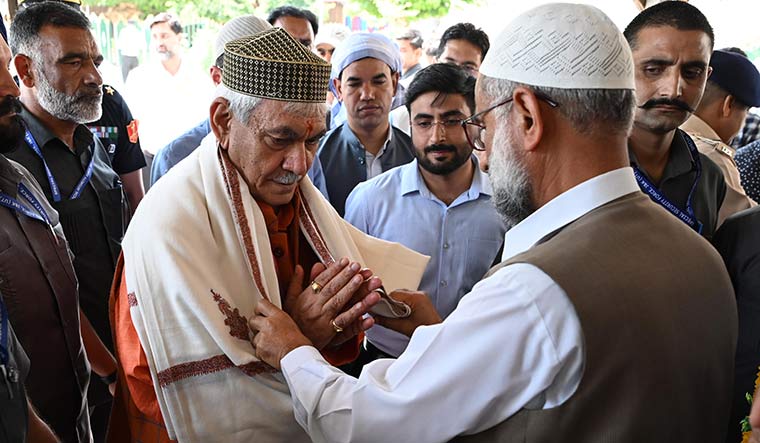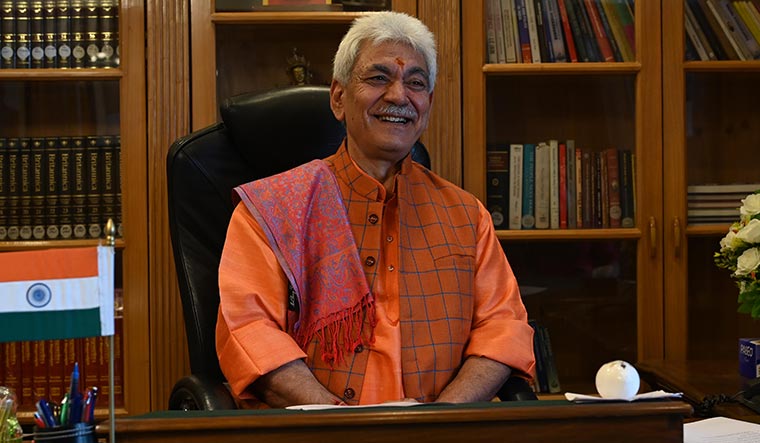MANOJ SINHA'S JOURNEY from the political hotbed of Uttar Pradesh to the political vacuum of Jammu and Kashmir was significant, as it came with the onerous task of winning the hearts and minds of people who had lost faith in the political class. In an exclusive interview with THE WEEK, Sinha says there has been visible change. Excerpts:
Q/ What have been the major changes in Jammu and Kashmir since the abrogation of Article 370?
A/ While there have been many achievements post abrogation of Article 370, the noticeable fact is that J&K, once infamous for street violence, has not had a single instance of stone-pelting [after that]. I don’t wish to elaborate on why it used to happen and who was getting it done, but it has become clear that it was part of an organised strategy.
Not more than 150 days would pass before there was a bandh call by terrorist groups or other Pakistan-sponsored elements, forcing schools, universities, colleges, trade and industry to shut down. The impact is unimaginable as the future of children got affected. Naturally, if a child does not go to school, it becomes easy to divert him into a wrong direction. The economy suffered heavily, which gave birth to a new kind of economy―parallel or conflict economy―where a certain kind of people hand in glove with the disrupters sitting across the border in Pakistan benefited and the poor suffered.
Now schools, colleges and trade are functioning and shops are open till late at night. The state has got a record 1.8 crore tourists so far [in 2023]. Naturally, the medium and small hotels, taxis, autorickshaws, houseboats and street vendors have got business, which is a big relief.
The common man is able to live without fear. Infrastructure like power generation and distribution, and projects worth more than Rs1.5 lakh crore to build tunnels and highways are under way. The prime minister has ensured that there are state-of-the-art hospitals like AIIMS, medical colleges, health and wellness centres, two central universities, IIT, IIM and NIFT in J&K.
Q/ What were the challenges in holding the G20 meet in Srinagar?
A/ Concerted attempts were made by Pakistan-backed outfits to spread misinformation using social media and other means to disrupt the G20 Tourism Working Group meeting. We managed to thwart such attempts. Since the winter was prolonged this year, black-topping of damaged roads could not be done as temperatures were low till March. But we managed to complete the work because of the enthusiasm of the people. As tourism increased, more and more people flocked to Kashmir. The biggest demonstration of peace took place in July with the Moharram procession being held for the first time in 34 years.
After the Covid pandemic, there was a drop in tourist influx, and militancy was another factor. Many countries had issued advisories to their citizens not to travel to J&K. I am expecting many countries to take back their travel advisories after the success of the G20 meeting and the way foreign dignitaries and visitors shared their happy experience.
Q/ Last year saw the completion of the delimitation process and revision of electoral rolls in J&K. How significant is this process?
A/ After the Jammu and Kashmir Reorganisation Act, 2019, Ladakh got separated from J&K and seven assembly seats were added. Aspects like which are going to be the assembly seats and what will be their boundaries can only be decided by the Delimitation Commission. The Delimitation Commission did its work with diligence by talking to people on the ground and meeting several delegations. Normally, before every assembly or Lok Sabha election, the process of revising electoral rolls also takes place and new voters are added. The old voter list is revised. That work has also been completed by the Election Commission. So, both the delimitation process and revision of electoral rolls were necessary for the election process to kick off.
Q/ The next logical step is assembly elections. How soon will that happen?
A/ Other than the assembly elections, all other elections have happened in J&K, whether it is the 2019 Lok Sabha polls or the establishment of the three-tier panchayati raj system for the first time. As far as the assembly polls are concerned, the necessary steps of delimitation and revision of electoral rolls have been completed. The Union home minister had said on the floor of Parliament that the first step will be delimitation, then elections and statehood at an appropriate time. Naturally, the next step is polls. The Election Commission will decide when the polls will be held and whether they are to be held alongside the Lok Sabha polls. Whenever it directs, the J&K administration will follow it.
 Matter of faith: Manoj Sinha at the Sufi shrine of Charar-i-Sharief in Budgam district | Salil Bera
Matter of faith: Manoj Sinha at the Sufi shrine of Charar-i-Sharief in Budgam district | Salil Bera
Q/ You flagged the issue of Pakistan-sponsored terrorism at the G20 meet. How did the international community react?
A/ At several international forums, including the United Nations, India has flagged the issue of Pakistan-sponsored terrorism. I feel today the entire world has accepted that Pakistan is the terror hotspot of the world. Just as India is the mother of democracy, Pakistan is the mother of terrorism. The delegates at G20 have experienced it on the ground this time by interacting with the people here and realised that Pakistan has played a huge role in disrupting peace in J&K.
Q/ How are you dealing with cross-border terrorism?
A/ The ceasefire on the Line of Control has brought relief to people living in border areas. Still attempts are being made to infiltrate and disturb the peace, and the Army and security grid in J&K are daily thwarting such attempts. I am not saying there is 100 per cent success because of the terrain, but there has been a significant drop. There is good coordination and security forces have an upper hand. I can say militancy is on its last leg in J&K. The clear approach of the Prime Minister of zero tolerance to terror will help establish permanent peace in J&K.
Q/ There are new threats like drones dropping weapons and drugs in J&K and neighbouring states?
A/ Drones and tunnels used for narco terrorism and arms smuggling is an area of concern. There were repeated attempts by cross-border elements to bring drugs into J&K, but the police and other security forces have brought it under control. DRDO and other technological institutions have been working to instal certain instruments on the border to detect and thwart it. The Union home minister is proactively addressing the growing concern over drugs. In J&K, arrests and seizures of narcotics have increased and anti-drug programmes are being held at the panchayat level. The police is augmenting its use of technology to maintain law and order, punish culprits and control the drug menace through active policing.
Q/ There have been targeted killings of civilians creating a new wave of terror.
A/ There have been some incidents of killing of innocent civilians and that is because the top commanders of terrorist groups are being eliminated by security forces and terrorists have become desperate to show their presence and disrupt peace. It is a despicable act and each case is being investigated thoroughly by the J&K police, not only to arrest the culprits but also to dismantle the terror ecosystem that supported such killings.
Q/ Do Kashmiri Pandits still desire to return and how are their concerns being addressed?
A/ All those people who are keen to return to J&K are welcome. Certain unfortunate incidents had led to the exodus of Kashmiri Pandits from the valley along with others creating a sizeable population of Kashmiri migrants who settled in Jammu and other parts of the country. The Congress government created a policy to grant 3,000 jobs and houses each but few houses were built and funds were not released as some of the houses did not fulfil the criteria. A similar number was added by the Modi government and today we have filled up 6,000 posts and given promotions that were long overdue. Today, land has been granted and another 3,000 houses will be ready by year end with adequate security arrangements. We have created grievance cells at district and state levels. At the social level also, there is a realisation that Kashmir is incomplete without the Kashmiri Pandits and J&K awaits their return.
Also read
- How Kashmiris are slowly opening their hearts and minds to new thoughts
- CID DG R.R. Swain: Valley’s own commando
- PWD Principal secretary Shailendra Kumar: Paving road to peace
- Athar Aamir Khan, commissioner, Srinagar Municipal Corporation: Keeping Kashmir smart
- J&K Sports Council secretary Nuzhat Gull: The people's champion
- IT secretary Prerna Puri: Transforming with technology
Q/ There is fear of demographic change because of outsiders buying non farmland in J&K, and domicile provisions.
A/ There is no fear in the people, but certain vested interests have sown seeds of doubt in their minds. The protection of land rights available to people in Himachal Pradesh or Uttarakhand has been kept in J&K as well. No outsider can purchase agriculture land here. The only concession has been to the industry because if we see the figures, only Rs13,000-14,000 crore investment came to J&K since independence. The new industrial policy has brought more than Rs80,000 crore worth proposals for investment, which is the highest in the country. On ground, more than Rs28,000 crore works are already under way. It must be kept in mind that the relaxation is only for hospitals, colleges, industries and hotels that will generate more revenue and employment. There are safeguards to protect the ecology and environment. In fact , some discriminatory laws preventing married daughters from owning land or denying voting rights to west Pakistan refugees are done away with.
Q/ There is concern about online radicalisation and recruitment by terror groups even as there are demands to improve internet connectivity. How will you balance the two?
A/ This challenge is there across the country and naturally it is more in J&K. We are trying to use technology to tackle online radicalisation and the emphasis is on improving sports infrastructure for the youth. More than 60 lakh people participated in sports last year in J&K. There are youth clubs in panchayats that are acting as a bridge between the government and the public. Cinema halls have been opened in Shopian, Baramulla, Pulwama and Kishtwar after 30-35 years. The youth of J&K want to live normal lives and contribute to nation-building.
Q/ Rebuilding J&K is a long process. Do you agree?
A/ Things that were spoilt in the past 70 years and deliberately worsened in the past 30-35 years cannot be rectified in four or five years. But the decision of the prime minister of abrogating Article 370 laid the foundation for rebuilding J&K in letter and spirit. I believe when India celebrates the centenary of Independence in 2047, J&K will be a key contributor to the growth story of the country.


